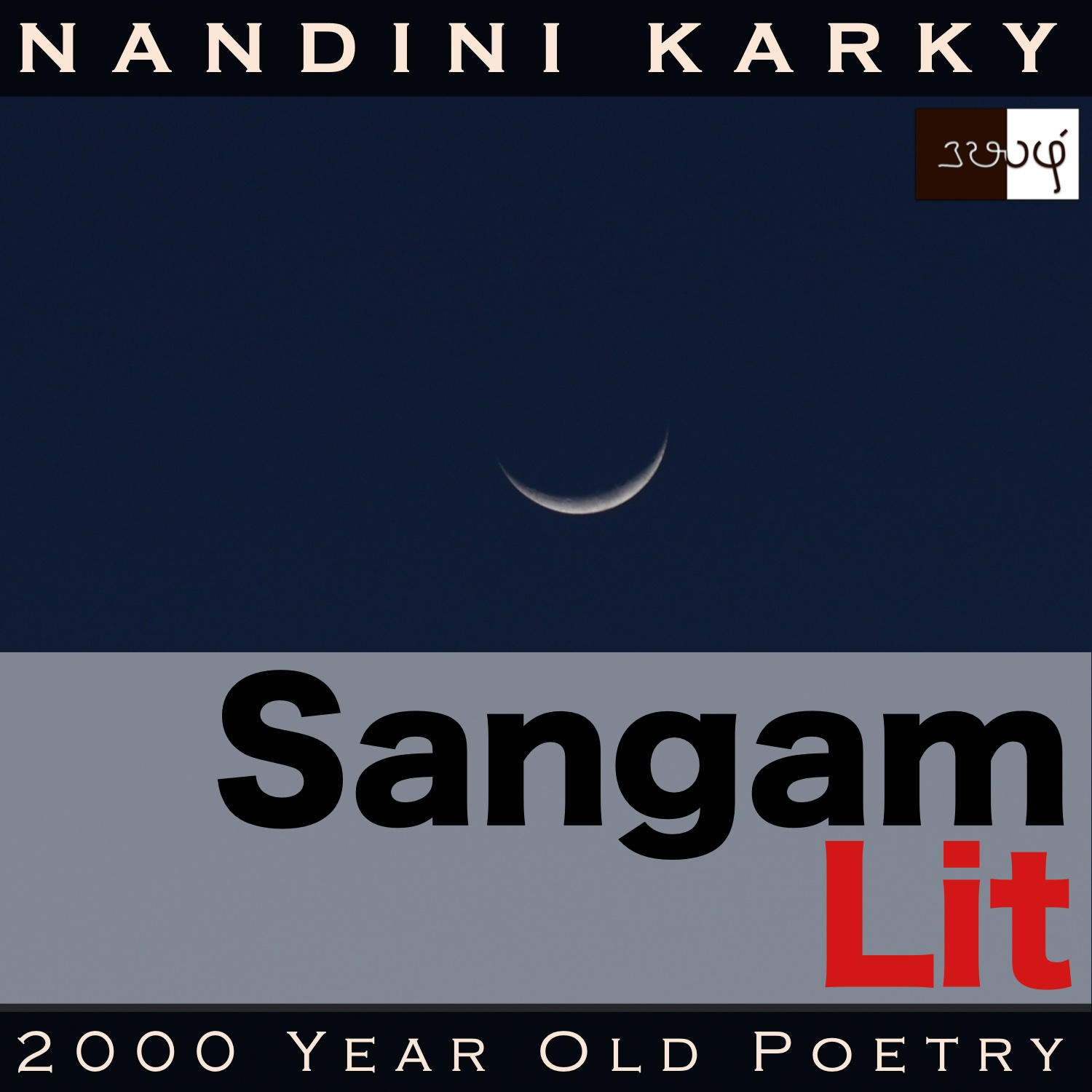Podcast: Play in new window | Download
Subscribe: Apple Podcasts | Spotify | Amazon Music | Android | iHeartRadio | TuneIn | RSS | More

In this episode, we perceive the dilemma in a man’s heart, as portrayed in Sangam Literary work, Natrinai 377, penned by Madal Paadiya Maathankeeranaar. Set in the mountain country of ‘Kurinji’, the verse speaks in the voice of the man to himself, passing on a pointed message to the confidante, listening nearby.
மடல் மா ஊர்ந்து, மாலை சூடி,
கண் அகன் வைப்பின் நாடும் ஊரும்
ஒள் நுதல் அரிவை நலம் பாராட்டி,
பண்ணல் மேவலமாகி, அரிது உற்று,
அது பிணி ஆக, விளியலம்கொல்லோ-
அகல் இரு விசும்பின் அரவுக் குறைபடுத்த
பசுங் கதிர் மதியத்து அகல் நிலாப் போல,
அளகம் சேர்ந்த திருநுதல்
கழறுபு மெலிக்கும் நோய் ஆகின்றே?
The verse opens with ‘மடல் மா ஊர்ந்து’ meaning ‘riding a horse, made of palmyra stems’ and immediately brings to fore, the custom of ‘Madaleruthal’ or ‘Madal oorthal’ that we have seen in other Natrinai poems. ‘ஒள் நுதல் அரிவை’ talks about ‘a young lady with a glowing forehead’, highlighting the importance rendered then to this part of a woman’s face. The sky’s delight sheds its silver rays on us in ‘பசுங் கதிர் மதியத்து அகல் நிலா’ meaning ‘the wide moon with radiant rays at midnight’. The phrase ‘அளகம் சேர்ந்த திருநுதல்’ talks about an ancient woman’s hairstyle meaning ‘a lustrous forehead on which hair slides’. Ending with ‘மெலிக்கும் நோய் ஆகின்றே’ meaning ‘becoming a disease that wreaks havoc’, the verse talks about pining from a man’s perspective and beckons us to listen intently.
The man had met the lady and fallen in love with her. The lady too reciprocated his feelings. However, the man has to win the confidence of the lady’s confidante before he can further his relationship with the lady. Meanwhile, owing to shyness, the lady does not share about her preference for the man to her friend and thereby, the confidante keeps refusing the man’s requests. One day, the dejected man, seeing the confidante arrive by, says to himself, “Through the wide open spaces of towns across the land, riding a palmyra horse and wearing a garland, I thought I should sing praises of the young lady with a radiant forehead. In the wide, dark sky, akin to a snake diminishing the wide, fresh-rayed, midnight moon, her fine forehead on which her hair cascades, has caused this disease that makes me suffer and invites the chiding of others. Even though this is difficult for me, even though it will become an affliction and end in my death, I have given up that thought!” With these words, the man expresses his dire state caught between conflicting thoughts and presses the confidante to relent in her stance.
Now, for the nuances! The man starts by talking about riding a palm horse and wearing a garland of unwanted flowers, and then, going through the streets of the towns, celebrating the lady’s shining forehead. To explain to those who are not aware, this is said to be a social custom wherein a man, continuously rejected in his advances to the lady, takes up the last resort of performing the ritual of sitting on a horse made of palm fronds and sharing about his love to the world. From our understanding of previous poems, we know that this act was something looked down upon. An act that brought disrepute to the lady and dishonour to the man! Returning to the verse, we see the man revealing to us that this is a thought in his head – something he wanted to do. Then, he goes on to talk about the dark, midnight sky and how the crescent moon appears as if eaten by the snake-like sky. And, this image is brought in parallel to a lady’s forehead, which is covered by her sliding tresses. The man has mentioned this to say how this aspect of the lady’s face causes a disease in him, which makes him suffer, and invites the anger of his friends, who declare that such a state is unbecoming of the man. He concludes with the words that even though that disease could end in his death, he has decided to give up his thought of riding the palm horse!
Hearing these words, the confidante would understand the immense love in the man’s heart for the lady and how, even in such untoward circumstances, he thinks considerately about her honour. This will make the confidante accept the man’s requests and find the way to take it to the lady. Yet again, these customs make us wonder about the complicated rules in relationships during those times. It makes us want to ask, ‘doesn’t the lady love the man, then what is the problem here’. If we were to ask that question, it would mean we are looking at the past with the lens of the present. It was another time, another life, and our lives are not the standard to measure the past with. As citizens of the past’s future, we can only look back, try to understand, and see the importance accorded to love, which remains a constant, now or then!




I’m continuously listening your sangam lit and learn new things daily like new metaphor. Tq so much😊